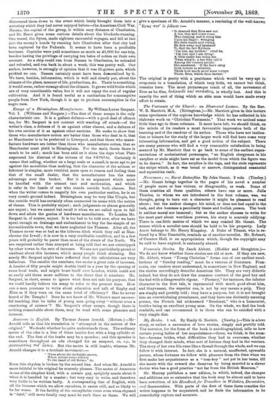Essays of a Birmingham Manufacturer. By William Lucas Sargent. Vol.
I. (Williams and Norgate.)—The first of these essays is the only characteristic one. It is a gallant defence—with a good deal of offence too, for Mr. Sargent is not content with warding off attack—of the writer's class, a defence of it as against other classes, and a defence of his own section of it as against other sections. He seeks to show that those who manufacture cotton are better than those who deal in it, that so Manchester is to be preferred to Liverpool, and that those who manu- facture hardware are better than those who manufacture cotton, that so Manchester must yield to Birmingham. For the main thesis there is much to be said ; much has been said on it since the days when Plato expressed his distrust of the virtues of the zcie,17.0;. Certainly it seems that selling, whether on a large scale or a small, is more apt to jar against the moralities than making, that the character of the artizan or labourer is simpler, more truthful, more open to reason and feeling than that of the small dealer, that the manufacturer has the same advantage over the broker. But it is an argument which must be handled with the utmost tact and moderation, and which is safer in the hands of one who stands outside both classes. But when the writer comes to magnify his own particular section, he is on very unsafe ground indeed. Birmingham may be very like Utopia, but the outside world has certainly often connected its name with the notion of shams. This is probably unjust ; such judgments on places generally are unjust ; but we cannot but recall it when we are called upon to fall down and adore the genius of hardware manufacture. To London Mr. Sargent is, of course, unjust. It is too bad to bo told now, after we have spent enough on drainage and embankment to buy the fee-simple of no inconsiderable town, that we have neglected the Thames. After all, the Thames never was so bad as the hideous ditch which they call at Man- chester the Irwell ; it is now in a very creditable condition, and in a few years will probably be purer than most of the rivers of the North. We are surprised rather than annoyed at being told that we are outstripped by other towns in the rate of increase. We are not particularly proud or exultant about this increase, which many people think alarming. But surely Mr. Sargent might have reflected that his calculations are very fallacious. The smaller the numbers, the easier a great rate of increase. A hamlet of fifty people might double itself in a year by the opening of some local trade, and might boast itself over London, which could not so easily add three more millions to the three that it numbers. Mr. Sargent, in short, seems to ignore what does not suit his purpose, that we could hardly believe his essay to refer to the present time. How can a man presume to write about education and talk of Rugby and Eton as if they were on the same level of efficiency ? Has he never heard of Dr. Temple ? Does he not know of Mr. Wilson's most success- ful teaching, that he talks of young men going away "without even a smattering of science"? Mr. Sargant's other essays, though there is nothing remarkable about them, may be read with some pleasure and interest.


































 Previous page
Previous page